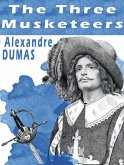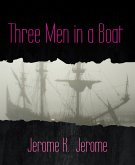Hearts of Three By
Jack London
Publisher: ShadowPOET
CHAPTER I.
Events happened very rapidly with Francis Morgan that late spring morning. If ever a man leaped across time into the raw, red drama and tragedy of the primitive and the medieval melodrama of sentiment and passion of the New World Latin, Francis Morgan was destined to be that man, and Destiny was very immediate upon him.
Yet he was lazily unaware that aught in the world was stirring, and was scarcely astir himself. A late night at bridge had necessitated a late rising. A late breakfast of fruit and cereal had occurred along the route to the library— the austerely elegant room from which his father, toward the last, had directed vast and manifold affairs.
“Parker,” he said to the valet who had been his father’s before him, “did you ever notice any signs of fat on R.H.M. in his last days?”
“Oh, no, sir,” was the answer, uttered with all the due humility of the trained servant, but accompanied by an involuntarily measuring glance that scanned the young man’s splendid proportions. “Your father, sir, never lost his leanness. His figure was always the same, broad-shouldered, deep in the chest, big-boned, but lean, always lean, sir, in the middle. When he was laid out, sir, and bathed, his body would have shamed most of the young men about town. He always took good care of himself; it was those exercises in bed, sir. Half an hour every morning. Nothing prevented. He called it religion.”
“Yes, he was a fine figure of a man,” the young man responded idly, glancing to the stock-ticker and the several telephones his father had installed.
“He was that,” Parker agreed eagerly. “He was lean and aristocratic in spite of his shoulders and bone and chest. And you’ve inherited it, sir, only on more generous lines.”
Young Francis Morgan, inheritor of many millions as well as brawn, lolled back luxuriously in a huge leather chair, stretched his legs after the manner of a full-vigored menagerie lion that is overspilling with vigor, and glanced at a headline of the morning paper which informed him of a fresh slide in the Culebra Cut at Panama.
“If I didn’t know we Morgans didn’t run that way,” he yawned, “I’d be fat already from this existence Eh, Parker?”
The elderly valet, who had neglected prompt reply, startled at the abrupt interrogative interruption of the pause.
“Oh, yes, sir,” he said hastily. “I mean, no, sir. You are in the pink of
condition.”
“Not on your life,” the young man assured him. “I may not be getting fat, but I am certainly growing soft Eh, Parker?”
“Yes, sir. No, sir; no, I mean no, sir. You’re just the same as when you came home from college three years ago.”
“And took up loafing as a vocation,” Francis laughed. “Parker!”
Parker was alert attention. His master debated with himself ponderously, as if the problem were of profound importance, rubbing the while the bristly thatch of the small toothbrush moustache he had recently begun to sport on his upper lip.
“Parker, I’m going fishing.” “Yes, sir!”
“I ordered some rods sent up. Please joint them and let me give them the once over. The idea drifts through my mind that two weeks in the woods is what I need. If I don’t, I’ll surely start laying on flesh and disgrace the whole family tree. You remember Sir Henry?—the old original Sir Henry, the buccaneer old swashbuckler?”
“Yes, sir; I’ve read of him, sir.”
Jack London
Publisher: ShadowPOET
CHAPTER I.
Events happened very rapidly with Francis Morgan that late spring morning. If ever a man leaped across time into the raw, red drama and tragedy of the primitive and the medieval melodrama of sentiment and passion of the New World Latin, Francis Morgan was destined to be that man, and Destiny was very immediate upon him.
Yet he was lazily unaware that aught in the world was stirring, and was scarcely astir himself. A late night at bridge had necessitated a late rising. A late breakfast of fruit and cereal had occurred along the route to the library— the austerely elegant room from which his father, toward the last, had directed vast and manifold affairs.
“Parker,” he said to the valet who had been his father’s before him, “did you ever notice any signs of fat on R.H.M. in his last days?”
“Oh, no, sir,” was the answer, uttered with all the due humility of the trained servant, but accompanied by an involuntarily measuring glance that scanned the young man’s splendid proportions. “Your father, sir, never lost his leanness. His figure was always the same, broad-shouldered, deep in the chest, big-boned, but lean, always lean, sir, in the middle. When he was laid out, sir, and bathed, his body would have shamed most of the young men about town. He always took good care of himself; it was those exercises in bed, sir. Half an hour every morning. Nothing prevented. He called it religion.”
“Yes, he was a fine figure of a man,” the young man responded idly, glancing to the stock-ticker and the several telephones his father had installed.
“He was that,” Parker agreed eagerly. “He was lean and aristocratic in spite of his shoulders and bone and chest. And you’ve inherited it, sir, only on more generous lines.”
Young Francis Morgan, inheritor of many millions as well as brawn, lolled back luxuriously in a huge leather chair, stretched his legs after the manner of a full-vigored menagerie lion that is overspilling with vigor, and glanced at a headline of the morning paper which informed him of a fresh slide in the Culebra Cut at Panama.
“If I didn’t know we Morgans didn’t run that way,” he yawned, “I’d be fat already from this existence Eh, Parker?”
The elderly valet, who had neglected prompt reply, startled at the abrupt interrogative interruption of the pause.
“Oh, yes, sir,” he said hastily. “I mean, no, sir. You are in the pink of
condition.”
“Not on your life,” the young man assured him. “I may not be getting fat, but I am certainly growing soft Eh, Parker?”
“Yes, sir. No, sir; no, I mean no, sir. You’re just the same as when you came home from college three years ago.”
“And took up loafing as a vocation,” Francis laughed. “Parker!”
Parker was alert attention. His master debated with himself ponderously, as if the problem were of profound importance, rubbing the while the bristly thatch of the small toothbrush moustache he had recently begun to sport on his upper lip.
“Parker, I’m going fishing.” “Yes, sir!”
“I ordered some rods sent up. Please joint them and let me give them the once over. The idea drifts through my mind that two weeks in the woods is what I need. If I don’t, I’ll surely start laying on flesh and disgrace the whole family tree. You remember Sir Henry?—the old original Sir Henry, the buccaneer old swashbuckler?”
“Yes, sir; I’ve read of him, sir.”









